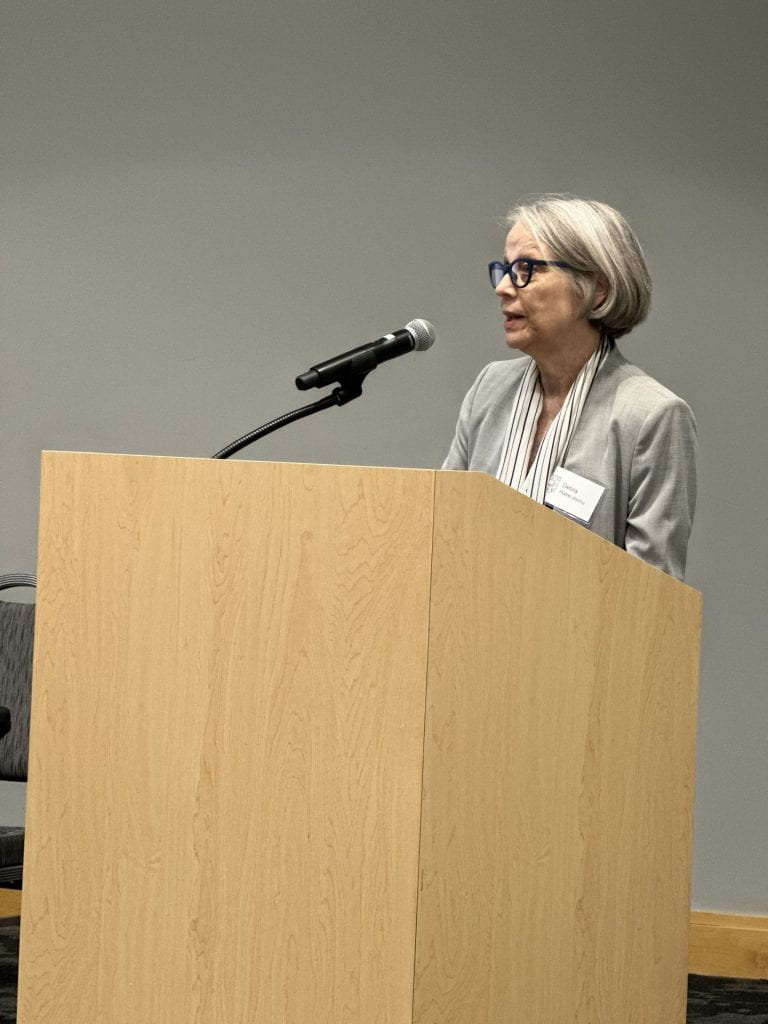Written by Kim Furlow, communications manager for the Institute for Public Health

On November 15, leaders from the Global Health Center at the Institute for Public Health and Department of Medicine, cardiovascular experts from the University of Abuja, Nigeria and project partners and leaders from Parents as Teachers National Center joined WashU alumni, faculty, students, and members of the WashU Alumni and Development team for a special event: “Global to Local Health: Community-Based Approaches to Improving Maternal Cardiovascular Health in St. Louis and Nigeria”.


Supported by the Office of the Provost and University’s Here and Next strategic vision, the event outlined two NIH-funded projects that focus on lowering high rates of maternal cardiovascular disease here in St. Louis and in Nigeria. The projects build upon seminal work conducted in St. Louis by Brown School faculty, Debra Haire-Joshu, PhD, and Rachel Tabak, PhD, in collaboration with School of Medicine Professor, Victor Davila-Roman, MD, and decades-long partner, Parents as Teachers National Center.
Featured speakers included ENRICH (St. Louis) primary investigators, Haire-Joshu, PhD, the Joyce and Chauncy Buchheit Professorship in Public Health, Brown School and School of Medicine; and, Director of the Global Health Center, Victor Davila Roman, MD. Speakers for the ENHANCE (Nigeria) project included Associate Professor and Chair, Department of Internal Medicine, Dike Ojji, PhD, University of Abuja Teaching Hospital in Nigeria. Senior Vice President and Chief Research Officer of Parents as Teachers National Center, Allison Kemner, who is a co-investigator on both projects, also spoke on PAT’s long collaboration with WashU.


Special guest and WashU Alumna, Kathryn Lindley, MD, who leads the Women’s Heart Center at Vanderbilt University Medical Center, spoke on focusing on prevention in global maternal cardiovascular disease.

Moderated by the Larry J. Shapiro Director of the Institute for Public Health, Bill Powderly, MD, and Global Health Center co-Director, Mark Huffman, MD, a panel of experts included the above speakers and:
Angela Aifah, PhD, Assistant Professor, Department of Population Health, New York University
Tiedra Marshall, MEd, Director of Expansion, Parents as Teachers National Center
Anthony Orji, PhD, Assistant Chief Medical Officer, Abuja Municipal Area Council; Adjunct Researcher, Cardiovascular Research Unit; University of Abuja Teaching Hospital, Nigeria
Cindy Schwarz, MPH, Associate Director Center for Obesity Prevention and Policy Research, Brown School, Washington University in St. Louis
Gabriel Shedul, PhD, Consultant Family Physician and Head of the Department of Family Medicine, University of Abuja, Nigeria
Rachel Tabak, PhD, Associate Professor, Brown School; Washington University in St. Louis



Dorian Traube, professor and Neidorff Family and Centene Corporation Dean of the Brown School, rounded out the program by commenting how true partnership is key to these very important local to global collaborations and how Brown School is proud to play a part through stewardship that focuses on social work and public health.
About the Global <–> Local Projects
ENRICH is part of a national collaboration funded by the NIH to promote intergenerational cardiovascular health of women and children in the high burden St. Louis, Missouri metro region, by rigorously testing HEALTH (Healthy Eating Active Living Taught at Home). This intervention is delivered through the Parents as Teachers (PAT) evidence-based home visiting model in partnership with the study team at Washington University in St. Louis. We apply expertise in implementation science to ensure the intervention has equitable application and impact.
ENHANCE-CVH: Nigeria has among the highest burdens of maternal morbidity and mortality in the world, which is coupled with a rising burden of noncommunicable diseases due to unhealthy changes in dietary patterns and physical activity, especially during critical life stages. ENHANCE tests the effects of implementing an adapted HEALTH (Healthy Eating Active Living Taught at Home) intervention on intergenerational cardiovascular health among women recruited during the antenatal period and their children in Nigerian primary healthcare centers. Improving maternal health behaviors and subsequent maternal cardiovascular health is a central strategy toward improving family cardiovascular health to blunt and eventually reverse the rising burden of noncommunicable diseases in Nigeria.
Below: Participants and guests at the Nov. 15 event.







Read this comprehensive overview of this global to local effort, which appeared in The Record at Washington University in St. Louis.